Sponsored Legislation
Bills Introduced in the 117th Congress:
One of the most important aspects of Congress is developing, making, and monitoring laws. I'm sponsoring and drafting legislation about issues that are important to San Diegans. If you have a question, concern, or idea for a bill, you can send me an email here.

The Veteran Peer Specialist Act expands the highly successful peer specialist support program to all Department of Veterans Affairs (VA) medical centers over the next five years. It prioritizes expansion to rural areas and areas far from active military installations and focuses on hiring peer specialists that reflect the racial and ethnic demographics of the veteran population. These specialists support fellow veterans and encourage recovery by helping them access health services and navigate the VA health care system, while also teaching coping and positive health-affirming behaviors.

The FAIR Transition and Competition Act establishes a border carbon adjustment (BCA) on polluting imports. Imposing a BCA will protect U.S. jobs, reduce global emissions, and provide enhanced support to communities that suffer the worst effects of climate change.

The Facilitating Innovative Nuclear Diagnostics (FIND) Act expands access to highly-targeted, precision radiopharmaceutical diagnostics so patients can get the right treatment for diseases, such as Alzheimer’s and Parkinson’s, faster. It would ensure adequate Medicare reimbursement to hospitals for procedures that use radiopharmaceuticals to diagnose, evaluate, and treat specific conditions as well as certain cancers. This would result in more accurate diagnoses, quicker treatment, higher quality care, and lower costs for patients and taxpayers.
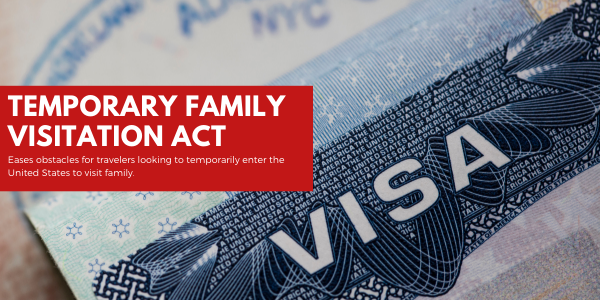
The Temporary Family Visitation Act (TFVA) eases obstacles for travelers looking to temporarily enter the United States to visit family by establishing a new B-3 nonimmigrant visa category specifically intended for relatives of U.S. citizens and permanent residents.
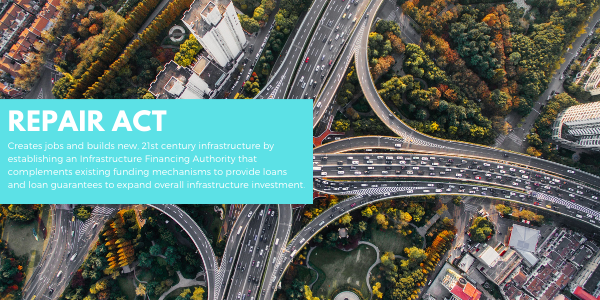
The Reinventing Economic Partnerships and Infrastructure Redevelopment (REPAIR) Act establishes an Infrastructure Financing Authority that complements existing funding mechanisms to provide loans and loan guarantees and expand overall infrastructure investment. Designed to become self-sustaining over time, this IFA would be independent of any federal agency and instead, would be run by an appointed Chief Executive Officer and a Board of Directors while still being subjected to strong congressional and federal oversight.
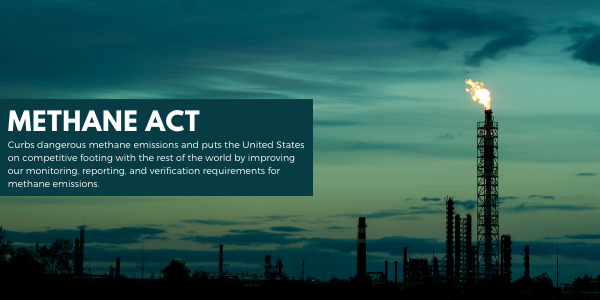
The Methane Emissions Technology to Help Achieve Net-Zero Emissions (METHANE) Act is a long-term, durable solution to curb dangerous methane emissions and put the United States on competitive footing with the rest of the world. It would improve our monitoring, reporting, and verification requirements for methane emissions based on the best available technologies. It would direct the Environmental Protection Agency (EPA) to set methane intensity standards for oil and gas facilities with substantial emission levels, allowing each facility owner to determine how to meet the relevant standard. The standards must decline in three-year increments and require the oil and gas sector to reach specified methane reduction targets.
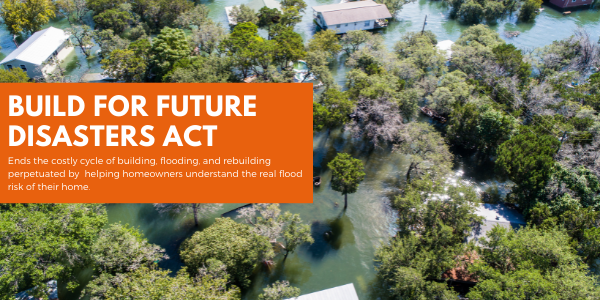
The Build for Future Disasters Act ends the costly cycle of building, flooding, and rebuilding perpetuated by the National Flood Insurance Program (NFIP). It would also require the U.S. Government Accountability Office to study the feasibility and implications of lowering all subsidies to a point that puts the NFIP on a path to stronger financial footing. Together, this would reduce taxpayer burden, stop growing government risk, and quash the implication the risk must be low if insurance is cheap.
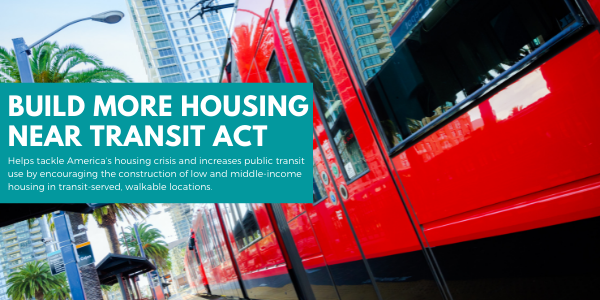
The Build More Housing Near Transit Act encourages the construction of low and middle-income housing in transit-served, walkable locations. It would provide incentives for transit applicants who meet requirements related to building more housing along the future transit corridor. It covers projects submitted under the Federal Transit Administration’s New Starts and Core Capacity programs, which fund projects like commuter rail, light rail, and bus rapid transit through the Capital Investment Grants (CIG) Program.
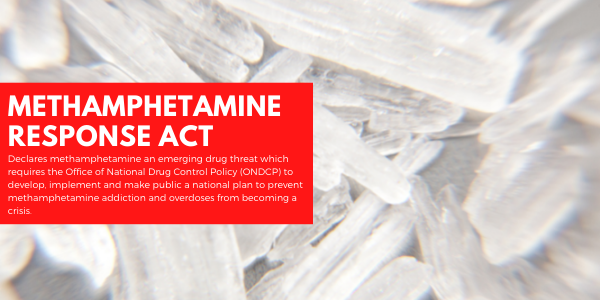
The Methamphetamine Response Act declares methamphetamine an emerging drug threat which requires the Office of National Drug Control Policy (ONDCP) to develop, implement and make public a national plan to prevent methamphetamine addiction and overdoses from becoming a crisis.
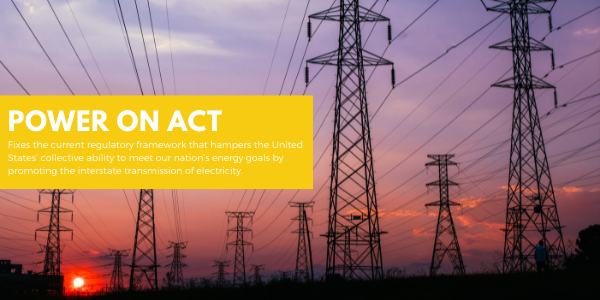
The Prevent Outages with Energy Resiliency Options Nationwide (POWER ON) Act fixes the current regulatory framework that hampers the United States’ collective ability to meet our nation’s energy goals. By promoting the interstate transmission of electricity, the POWER ON Act will boost reliability, help decarbonize the power sector, electrify the transportation sector, adapt the grid to withstand the devastating effects of climate change, and lower electricity costs for consumers.

The Workforce Mobility Act helps American workers by narrowing the allowable use of non-compete agreements to only include extraordinary cases like the sale of a business or the hiring of senior executives. It would also require employers to explicitly inform their employees of the limitations non-compete agreements impose. This would give power back to the American worker so they can achieve their full potential and enhance our economy’s competitiveness.

The Wage Increase Fairness Act prohibits a state or municipality from establishing minimum wage requirements that treat independently owned franchises differently than other businesses based on the status of such franchises under federal law as distinct enterprises from their franchisors.
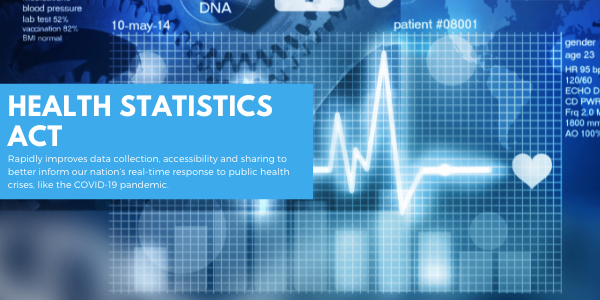
The Health STATISTICS Act improves data-sharing efforts to better inform our nation’s real-time response to public health crises. A critical issue exposed during the COVID-19 pandemic, information gaps and barriers in the United States data infrastructure significantly slowed the government’s response to address the true scope of the outbreak. This legislation takes immediate steps to streamline data-sharing agreements, remove data siloes, and fix the patchwork of data systems responsible for recording and reporting vital statistics.
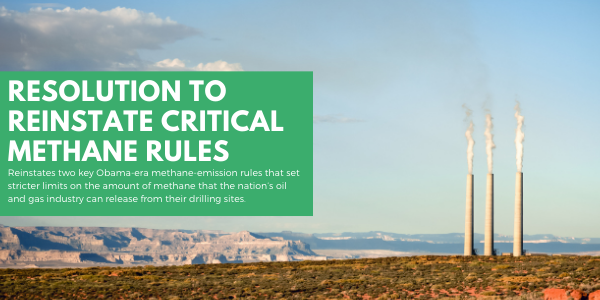
This special resolution reinstates two key Obama-era rules that set stronger regulations on the nation's oil and gas industry. Specifically, it heightens standards on methane pollution emitted during the production and processing of oil and natural gas, and the amount of methane that can be released during oil and natural gas's transmission and storage.
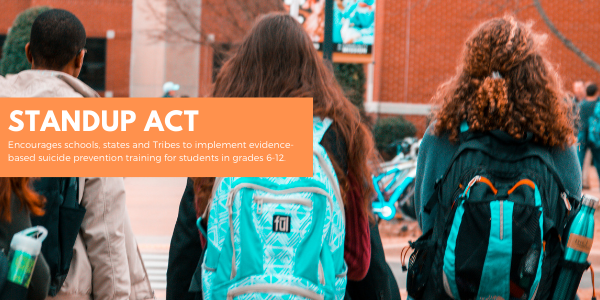
The STANDUP Act encourages schools to implement evidence-based suicide prevention training for students in grades 6 through 12. It would require states, schools and Tribes to implement proven policies to prevent suicides in order to receive Project AWARE grants, which promote youth mental health awareness among schools and communities. These policies are vital in stopping school violence by encouraging early prevention, teaching warning signs and giving students, teachers, and administrators the tools they need to react properly to threats before tragedy occurs.
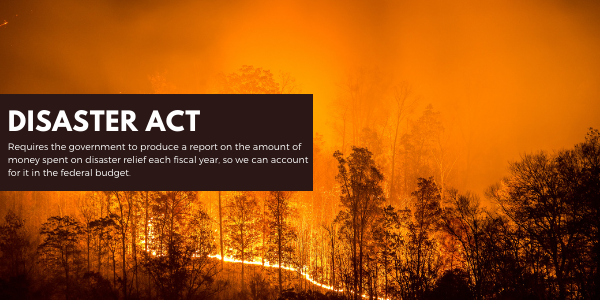
The DISASTER Act requires the Office of Management and Budget to submit an annual report to Congress on all disaster-related assistance provided by the federal government. The report must include all federal obligations related to disaster response, recovery, mitigation efforts, and administrative costs associated with these activities for specified agencies and programs.
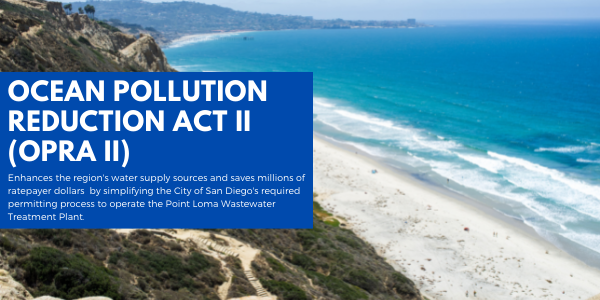
The Ocean Pollution Reduction Act II (OPRA II) simplifies the City of San Diego’s required permitting process to operate the Point Loma Wastewater Treatment Plant (PLWTP). It would solidify the region’s water security and further cut the amount of wastewater that flows into the ocean from the plant.
--------------------------------------
Legislation I introduced in the 116th Congress (2019-2020)
Legislation I introduced in the 115th Congress (2017-2018)